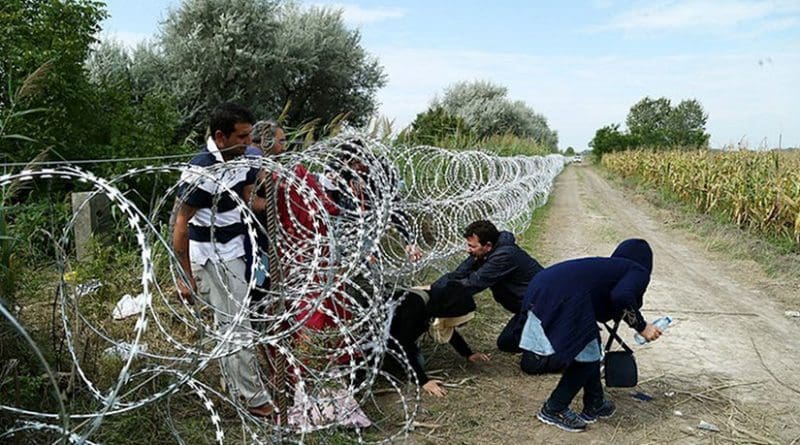Balkan Countries Fear Becoming Buffer Zone For Refugees
By EurActiv
By Georgi Gotev
(EurActiv) — Fearing that Western countries will close their borders, Macedonia, Serbia, Croatia and Slovenia are only letting refugees whose registration papers say that they will apply for asylum in Austria and Germany pass through.
Some 2,000 asylum seekers began crossing into Macedonia yesterday (21 January) in freezing temperatures as the country conditionally reopened its border with Greece after closing it temporarily.
“The border crossing for migrants near (Macedonian border town) Gevgelija opened early this morning, but only those migrants whose Greek registration papers show their final destination as Germany or Austria can enter,” a senior police official in Skopje told AFP.
The EU has set up ‘hotspots’ in Greece and Italy with the aim of registering refugees who sometimes travel without any kind of documents. Greece has one ‘hotspot’ and must set up a total of five on the islands of Lesbos, Samos, Leros, Kos and Chios.
Macedonia had temporarily closed its border on Wednesday (20 January), blocking the path of hundreds trying to reach northern Europe. The same day, the Austrian government announced that it would cap the number of people allowed to claim asylum this year, and that it would send excess refugees back, or deport them to the neighbouring countries through which they came.
Austria last week also signalled that it would follow neighbouring Germany’s lead, and begin turning back any new arrivals seeking to claim asylum in Scandinavia, after Sweden and Denmark tightened their borders.
Most of the asylum seekers – mainly conflict refugees from Syria, Iraq and Afghanistan – had slept in heated tents operated by aid groups.
Among them are families with hundreds of children.
A humanitarian disaster in the making
After Macedonia temporarily closed down the border this week, aid groups had warned that their resources had been stretched to capacity.
“If this flow continues there is no possibility for accommodation,” Antonis Rigas, head of the local Doctors Without Borders mission to the Greek side of the frontier, told AFP earlier.
“It gets very cold at night. Early this morning the temperature was minus seven Celsius,” he said.
Some 600 refugees had already spent the night on buses parked a few kilometres from the border.
Macedonia on Wednesday said it had closed the border with Greece owing to problems with Slovenian trains that had disrupted the flow of migrants moving further north.
Greek police countered that the frontier had actually shut a day earlier.
And the Slovenian rail company Slovenske Zeleznice insisted they were running services as normal.
Leading children’s charities have warned that young refugees were at serious risk from the bitterly cold Balkan weather, as figures showed 31,000 migrants had arrived in Greece already this year.
Macedonia’s plans to allow through only those who seek refuge in Austria and Germany follows similar decisions by countries further along the main migration route – Serbia and Croatia announced they would do the same on Wednesday.
Slovenia made a similar announcement yesterday. The country’s Vesna Gyorkos Znidar said Slovenia will keep out all migrants apart from those planning to seek asylum in Austria and Germany, adding the country would also strengthen border controls.
“We will act in all directions so as to prevent Slovenia becoming a pocket for stranded migrants,” Gyorkos Znidar said after a regular government meeting.
Slovenia is the smallest country on the Balkan route. About 409,000 refugees have entered since October, when Hungary closed its borders and pushed the migrant route west through Slovenia.
So far, almost all refugeeshave continued on their way to Austria and further on to northern Europe.
Slovenia has said it will have to follow Austria’s example and introduce a cap on asylum seekers because the small Alpine state of 2 million people does not have the capacity to accommodate a large number of migrants.
Gyorkos Znidar urged the EU to reach agreement on stopping refugees on the border between Macedonia and Greece to prevent them continuing north through the Balkans.
Countries along the Balkan route earlier restricted entry only to migrants from Syria, Afghanistan and Iraq.
An inconclusive summit
Last October Commission President Jean-Claude Juncker called a mini-summit in Brussels to tackle the refugee crisis along the Western Balkans route. Those invited were the leaders of EU countries Austria, Bulgaria, Croatia, Germany, Greece, Hungary, Romania and Slovenia and their colleagues from non-EU states Macedonia, Serbia and Albania.
The summit ended with a plan to increase to 30,000 by the end of 2015 the number of places to host refugees in Greece, and to make available another 50,000 places in countries further north, without any other detail.
It became obvious at the mini-summit that the countries on the Balkan route have no plans whatsoever to become a buffer zone for migrants, who anyway have no intention to stay there and seek to reach the wealthy countries further north.
Bulgarian Prime Minister Boyko Borissov has made it plain that the countries on the Balkan route won’t allow to be transformed into refugee camps.
“If Germany, Austria and other countries close their borders, we will not let our peoples become a buffer zone. We will be ready in the same way to close our borders,” Borissov said last October.
It looks like the only result from the October mini-summit is that the countries on the Balkan route are holding weekly teleconferences and exchange data.
More than one million refugees crossed the Mediterranean Sea to Europe in 2015, nearly half of them Syrians, according to the UN refugee agency, UNHCR.
The International Organisation for Migration said this week that 31,000 had arrived in Greece already this year.

